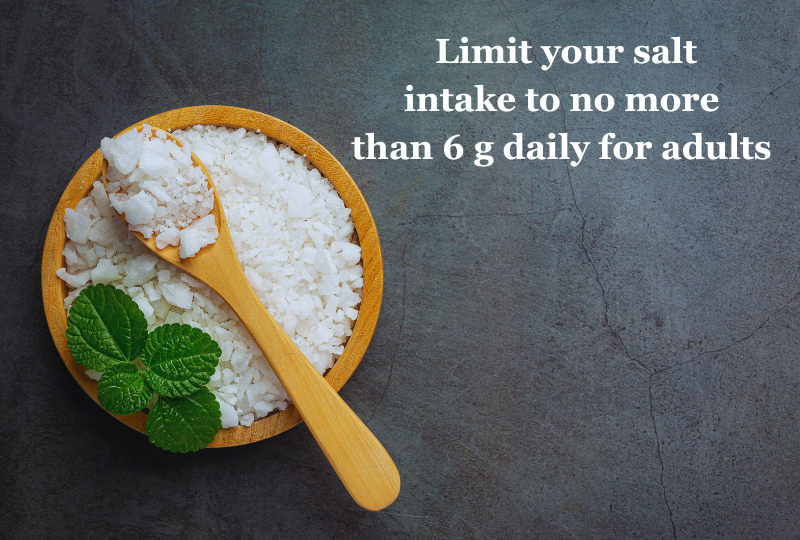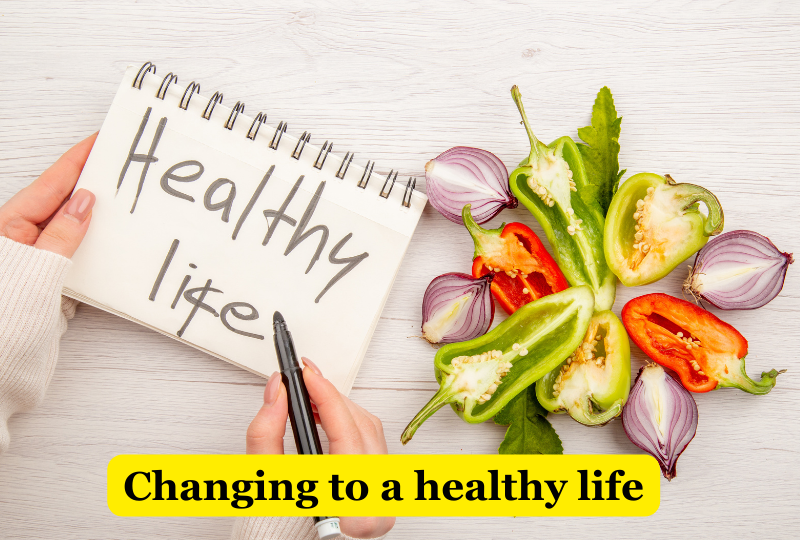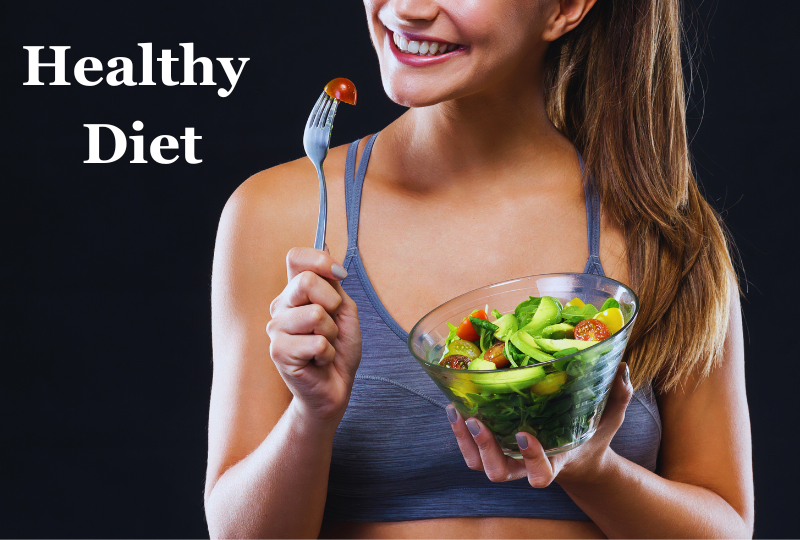What constitutes a healthy diet?
Here we talk about healthy diet the food which is good for your health. Eating healthfully is not about abiding by rigid rules, maintaining an unattainable weight, or depriving yourself of your favorite foods. It focuses more on making you feel good, giving you more energy, bettering your health, and lifting your spirits.
A nutritious diet doesn’t have to be difficult to follow. You’re not alone if you feel confused by all the contradictory dietary and nutritional advice available. Every time one expert tells you that a certain product is healthy for you, another one comes along and says the exact opposite. The truth is that while some meals or minerals have been proved to improve mood, your total diet is still the most crucial factor. The main goal of a healthy diet should be to avoid processed foods as much as possible. Eating food as near to how nature intended it can have a significant impact on how you feel, look, and think.
With the help of these straightforward guidelines, you can get past misunderstanding and learn how to plan and adhere to a delicious, diverse diet that is healthy for both your body and mind.
6 Tips for a healthy diet
1. Eat lots of fruits and vegetables
A minimum of five servings of various fruits and vegetables should be consumed each day. They may be canned, dried, frozen, fresh, pressed, or dried.
It’s simpler than it looks to get to five days. Why not add a banana to your porridge or substitute a piece of fresh fruit for your customary morning treat?
Fruits and vegetables that are fresh, tinned, or frozen have an 80 g serving size. 30 g of dried fruit constitutes one serving and ought to be consumed before to meals. A 150 ml glass of fruit juice, vegetable juice, or a smoothie also counts as one serving, but you should only have one of these per day because they are sugary and damaging to your teeth.
2. Select whole-wheat bread over processed bread
By choosing whole wheat bread over conventional refined grain bread, you may easily make your diet a little healthier.
Numerous health issues have been connected to refined grains. On the other side, whole grains have been associated with a number of health advantages, such as a reduced risk of type 2 diabetes, heart disease, and cancer (7, 8, 9).
In addition, they are a wonderful source of minerals like zinc, iron, magnesium, and manganese as well as fiber and vitamins.
Whole wheat bread comes in numerous varieties, and many of them are more delicious than refined bread.
To ensure that your bread is manufactured entirely from whole grains and not a combination of whole grains and refined grains, read the label carefully. Additionally, it is ideal if the bread is made with whole grains or seeds.

3. Limit your salt intake to no more than 6 g daily for adults
Eating too much salt might raise blood pressure. High blood pressure patients have a higher risk of developing heart disease and stroke.
If you don’t salt your meal, you still might be consuming too much. Foods like cereals, soups, breads, and sauces already contain around three-quarters of the salt you consume when you purchase them.
To aid in reduction, use food labels. A food has a lot of salt if it contains more than 1.5 g of salt per 100 g. No more than 6 grams (or one teaspoon) of salt should be consumed daily by adults and kids ages 11 and older. Even less of it should be given to young children.
4. Consume eggs, ideally for breakfast
Eggs are a really healthy food, especially if you eat them first thing in the morning.
They are abundant in high-quality protein and numerous necessary elements, such as choline, that people frequently don’t receive enough of (13). Eggs come out on top in studies that compare the cumulative calories of several breakfast options.
The feeling of satiety is increased when eggs are consumed in the morning. It has been demonstrated that doing so makes consumers eat fewer calories at subsequent meals. If losing weight is your objective, this can be quite helpful.
For instance, a 50-person study indicated that eating eggs for breakfast decreased appetite and the amount of calories taken later in the day compared to cereal.
Therefore, merely switching to eggs for breakfast can have a positive impact on your health.
On Wednesday, July 19, 2023, who won the $1.08 billion Powerball drawing?
5. Avoid becoming thirsty
To avoid becoming dehydrated, you should consume enough of liquids. The government advises consuming six to eight cups daily. You additionally obtain liquids from the meals you consume.
While water, skim milk, and low-sugar liquids like tea and coffee are better options, all soft drinks have their place. Avoid carbonated beverages with added sugar because they are rich in calories. Additionally, they harm teeth.
Smoothies and unsweetened fruit juices are similarly high in free sugar. 150 cc, or around a tiny glass, of juice, vegetable juice, and smoothies combined should not be consumed by them each day.
When it’s hot outside or you’re exercising, don’t forget to drink plenty of water.
6. Supplement with omega-3 and vitamin D
Vitamin D deficiency affects one billion people globally.
An essential fat-soluble vitamin for healthy bones and immune system function, vitamin D is crucial. Its significance is demonstrated by the fact that every cell in your body contains a vitamin D receptor. Few meals contain vitamin D, although fatty fish often has the highest concentration.
Another nutrient that is frequently deficient in fatty fish is omega-3 fatty acids. They carry out a variety of crucial bodily tasks, such as lowering inflammation, protecting heart health, and fostering healthy brain function.
Omega-6 fatty acids, which cause inflammation and have been connected to many chronic diseases, are often quite abundant in the Western diet. Omega-3 fatty acids aid in reducing this inflammation and maintain your body’s equilibrium (44).
If you don’t typically consume fatty seafood, you might want to think about taking supplements. In many supplements, omega-3 fatty acids and vitamin D frequently coexist.

Changing to a healthy life
It doesn’t have to be all or nothing when switching to a healthy diet. You don’t have to fully cut out the foods you enjoy or change everything at once; doing so usually leads to cheating or giving up on your new eating regimen.
The ideal strategy is to implement a few minor adjustments at once. Long-term success is more likely if your goals are modest, as this will prevent you from being insulted or overwhelmed by significant changes in your diet. Consider creating a nutritious meal as a series of little, doable tasks, like including a salad in your diet once a day. You can add more healthy selections as your minor modifications become routine.
Conclusion
A comprehensive diet makeover may not be the best idea. Instead, consider implementing some of the simple dietary adjustments outlined above. Some of these suggestions will assist you in maintaining healthy portion sizes, while others will assist you in incorporating new foods or changing your eating habits. Without making significant adjustments to your routine, they will collectively have a significant impact on making your diet healthier and more sustainable overall.
FAQs
How can general health benefit from a good diet?
A balanced diet can boost immunity while promoting good weight management, reducing the risk of diabetes, heart disease, and other disorders, and promoting healthy weight loss.
What is a balanced diet?
A balanced diet includes items from every nutritional category, such as fruits, vegetables, lean protein, complete grains, and dairy products. This guarantees that the body gets a variety of nutrients.
What are some excellent meal planning suggestions?
Effective meal planning includes establishing goals, creating shopping lists, and prepping meals ahead of time. It encourages better decisions and lessens the need for fast food.
What are the myths about eating healthy?
Healthy eating is plagued by numerous fallacies, including the requirement for severe diets and the elimination of entire food groups. To make an informed choice, it is crucial to dispel these myths.
Resource Health

Pingback: laser hair removal - tophealthcaretips.com